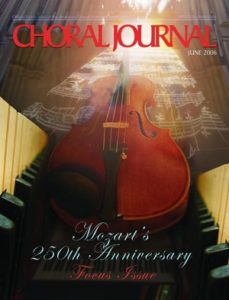In June 2006, the Choral Journal published a special focus issue on Mozart’s 250th anniversary, guest edited by Lawrence Schenbeck. As Schenbeck states in his editor’s column, “What surprised me in surveying recent research on [Mozart’s] choral music is how much we still have to discover. The four articles have one common, central theme: each offers something genuinely new about the subject—new repertoire, new analysis techniques, new performing materials.” Ten years later, in 2016, I wonder what new light we can shed on this composer and his choral music.
Below are the four articles featured in this anniversary issue with a brief synopsis.
1) “The Choruses of Die Zauberflote in Context: Choral Music at the Theater auf der Wieden” by David J. Buch – Choral music and musicians in the suburban Viennese theater where Mozart produced Die Zauberflote.
2) “Adding Birds to Mozart’s ‘Sparrow Mass’: An Arrangement with Children’s Instruments by Paul Wranitzky” by John A. Rice – A “new” version of Mozart’s “Sparrow” Mass, one that could prove the highlight of a future concert season for you, or at least an engaging novelty for a special occasion.
3) “The Principle of Chromatic Saturation in the Late Choral Music of Mozart and Haydn” by Edward Green – The author applies the concept of chromatic saturation to the choral music of Mozart and Haydn.
4) “Mozart’s Evolving ‘Great’ Mass in C Minor” by Timothy Newton – A guide through the thicket of recent ‘completions’ of the Mass in C Minor, K. 427/417a.
Choral Journal issues such as this one are valuable for choral conductors and choral music enthusiasts alike. The rich history of composition and conducting is relevant still today, and anniversary years are always a good time to reflect and learn.
Click here to download the full issue in PDF format. (Note: You must be logged into the acda.org site as a member in order to access the Choral Journal online.)
Do you have a favorite composer? What work or works by Mozart do you enjoy?



Leave a Reply
You must be logged in to post a comment.